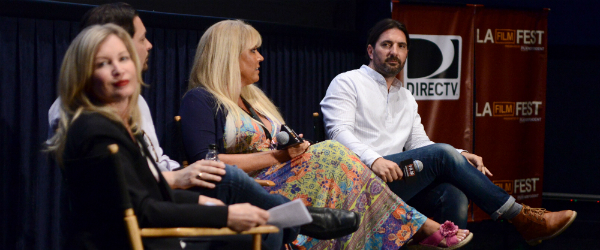LA FILM FEST 2013: Screenwriting Tips For Beating Procrastination to Outlines & Beat Sheets

“The movie is written three times: once, when you write it, once when you shoot it, once when you edit it.” Iron Man 3 screenwriter Drew Pearce on the writing process at this year’s Coffee Talks: Screenwriters.
By Wendy Chuong / LA Film Fest Guest Blogger
Katherine Fugate, Drew Pearce, Karen McCullah and James Vanderbilt came to the 2013 LA Film Fest to discuss their personal approaches to the screenwriting process, but not without first revealing a few secrets about themselves.
Vanderbilt was afraid of a whole slew of things, some of which being insects, dancing, and jello. Pearce was the lead singer in an alternative-country band called Woodchuck. McCullah hosted cocktail hours, which she also called a procrastinator’s club.
Along the vein of procrastination, the writers discussed how to avoid this seemingly inescapable writer’s disease. Pearce recommended an app called Freedom that locks certain websites for a set amount of time, explaining, “I have a page count that I tell myself I have to hit everyday or I get in a really bad mood.”
Fugate adopted much more hardcore tricks to end her procrastination: writing fake checks back to the studio or giving up her story ideas to friends. The unsettling feeling accompanied by both these actions allowed Fugate to write much quicker.
Vanderbilt continued, “The time I’m not actually typing is still writing time,” subscribing to the belief that writers are always being inspired by their surroundings, and that inspiration can become screenplay material.
From Procrastination to Outlining, Treatments & Getting It Done
Once they’ve stopped themselves from procrastinating? Instead of doing cards, all the writers preferred outlining, or in McCullah and Pearce’s case, detailed beat sheets. Fugate and Vanderbilt discovered verbally telling other people their stories as if they had already seen them in a movie is helpful in deciding what is important and what people get excited about. The process of rewriting acts or entire works requires an objective distance, Vanderbilt found, a distance from leaving it alone for a period of time, Woody Allen-style.
Pearce described the importance of having a trusted team of readers to look at specs as the most important thing for his rewrites, citing the film Shaun of the Dead as an example where the screenplay was given to a reader who loved the humor, but wanted to get rid of all the zombies. An understanding of the tone of a piece of work and of what the writer is trying to achieve, according to Pearce, is crucial in selecting readers.
After so much time and effort put into a screenplay, writers often wish to see their story get made, and Pearce believed that the growing trend in the industry is to have the writer on set and through the editing process as he was on Iron Man 3, saying, “The movie is written three times: once, when you write it, once when you shoot it, once when you edit it.” In agreement with Pearce, Vanderbilt described his experience similarly and found having a welcoming director like David Fincher to be vital in allowing the writer to be closely tied to the production process.
As screenwriting continues to develop, and writers’ and directors’ relationships get closer, it has become more important than ever for screenwriters to, as Pearce put it, “make stuff,” be that sizzle takes or educating yourself about camera lenses. Get inspired by these writers’ processes, just don’t procrastinate to do it!